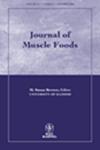COMPARISON OF THE EUROPEAN ECONOMIC COMMUNITY FOUR-PLATE TEST, PREMI TEST AND ENZYME-LINKED IMMUNOSORBENT ASSAY FOR OXYTETRACYCLINE RESIDUE DETECTION IN RAINBOW TROUT (ONCHORHYNCUS MYKISS)
Abstract
ABSTRACT
The four-plate test (FPT), Premi test and enzyme-linked immunosorbent assay (ELISA) methods were used for screening oxytetracycline residues in fish samples. FPT is a microbiological inhibition test which uses three media seeded with Bacillus subtilis at different pH values (6, 7.2 or 8.0), and a fourth medium seeded with Micrococcus luteus. Fish fed with pellets containing antibiotics: the inhibition zones increased according to duration of feed application. Fish fed with pellets containing antibiotics: at day 1, the inhibition zone was found to be 2.5 mm wide; at day 4, the zones increased to 12.25 mm wide. The concentration of the residues accumulated and reached a plateau after 4 days. At day 15, the antibiotics were still detectable, but 5 days later (at day 20), they were no longer detectable in the fish samples. According to the Premi test, results of fish samples: fish samples of the control group were found negative, from days 1 to 20; the samples were found positive, at day 25; the samples were found negative. The results showed us that the Premi test and ELISA test were more sensitive than the European Economic Community FPT. In contrast to the FPT, 10 days after discontinuing the medicated diet, there were still residues detectable by the Premi test and ELISA test (at day 20). Data presented show the FPT, Premi test and ELISA test methods are very suitable for screening oxytetracycline residues in trout.
PRACTICAL APPLICATIONS
The use of antibiotics above the maximum residue limits could result in unsafe antibiotic residues in food products. Therefore, monitoring antibiotic residues in food products are necessary to prevent unapproved uses of antibiotics. The aim of the present study was to determine the most useful method for screening oxytetracycline residues in trout.

 求助内容:
求助内容: 应助结果提醒方式:
应助结果提醒方式:


